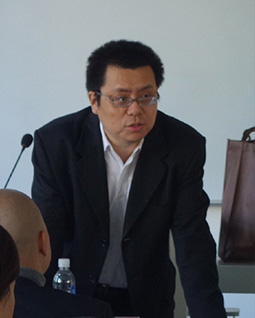PENG dajin
Create Date: 2018-03-21 Click: 1386119 
PENG dajin
Postdoctorate at Waseda University, Japan
Shanghai Maritime University Guest Professor
Introduction
Professor Peng Dajin is currently a guest professor at Shanghai Maritime University and a tenured professor at the University of Florida, South Florida, USA. He is also the first dean of the Confucius Institute at the University of South Florida.
Professor Peng Dajin also holds a Ph.D. in business management from Princeton University, a master's degree in economics from the University of Akron, and a master's degree in international relations from the Beijing Institute of International Relations.
Prof. Peng Dajin has been in the "International Studies Quarterly" (American Institute of International Relations), "Political Quarterly" (American Academy of Political Science), "Pacific Affairs" (the flagship academic publication of North American Asia Pacific Studies), and "Asia and Africa." The quarterly magazine publishes more than twenty academic papers in numerous academic journals. He was invited by many universities and institutions to give lectures. For example, he was invited by the Harvard Business School to give lectures on international and Asian business; he was invited by the University of Cambridge to give lectures on globalization issues; he was invited by the Japan Economics Association to give a lecture on the Asia-Pacific economy integration report, etc.
The main research areas
International and Asian Business, International Business Comparison, International and Asia-Europe Business Comparison, International Trade, International Finance and International Business Strategy.
Major academic achievements
“Ethnic Chinese Business Networks and Asia Pacific Integration”, Journal of Asian and African Studies, Vol. 35, No. 2 (May 2000); also presented at the 1998 APSA Annual Meeting, Boston, September 1998
“Does Confucianism Matter? - The Role of East Asian Culture in Economic Development in East Asia”, in Economic Development in Twentieth Century East Asia, edited by Aiko Ikeo, London: Routledge, 1997, also presented in the 2nd Symposium on East Asia in the 20th Century, Tokyo, September 1995
“Structure of Global Business Operations”, working paper, Waseda Business Series, forthcoming, 2005
“Explaining the Rise of the Chinese Business”, in China in the 21st Century, edited by Henry Chen, Florida University Press, forthcoming in 2005
“US-Japan-China Triangle: How Does It Affect Sino-Japanese Relations?", SIIS (Shanghai Institute of International Studies) Journal, Vol. 9, No. 4, December 2002, also presented at the In’l Seminar of US-Japan-China Relations, October 2002
“How Did the Chinese Economies Sustain the Asian Crisis”, in Hanchao Lu (ed.), Taiwan de Xiandaihua he Wenhua Rentong (Modernization and Cultural Identity) (River Edge, N.J.: Global Publishing, 2001), also presented at the International Seminar on China-Taiwan Relations, Taipei, July 2000
“East Asian Model of Business”, in East Asia after the Cold War, edited by Hongshan Li, Hong Kong: Social Science Publisher, 1999, also presented at the International Seminar on Asia Pacific International Relations, Hong Kong, May 1998
“Business Chinese Style”, in Chinese Linkages, edited by Quansheng Zhao, Florida-China Institute, 2003
“New Business Organization and Global Business Strategies”, Global Business Review, forthcoming, Winter 2005
“Japanese Business Strategy and Regional Economic Integration in East Asia”, Waseda Social Science Review, Vol. 43, No. 1 (1997); also presented at Japan Business Studies Association Conference, Hawaii, January 1996
An East Asian Model of Business Cooperation, Working Paper, Center of European and Asian Studies, Oslo, Norway, 1997, alternative versions also presented at the 1996 APSA Annual Meting, San Francisco, August 1996, and at the Joint Convention of ISA and Japan Association of International Relations, Tokyo, September 1996
“East Asian National Identities and Regionalism in East Asia”, Journal of Shibusawa Studies, No. 9 (1996); also presented at Symposium of National Identities of East Asia, Princeton, May 1994
The Rise of A Pacific Community: An Analysis of Pacific Cooperation, University of Michigan Collections, 1995


